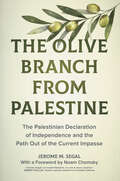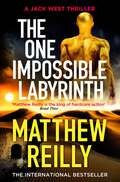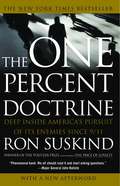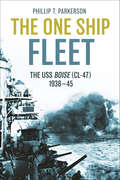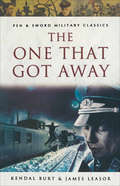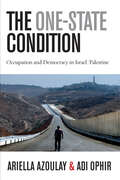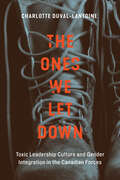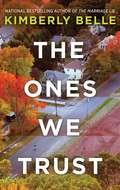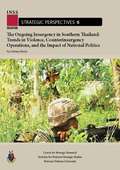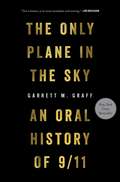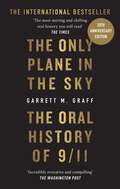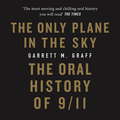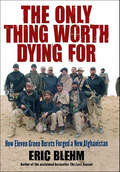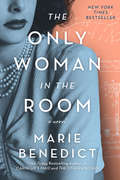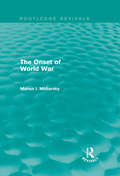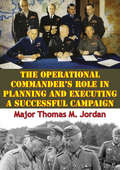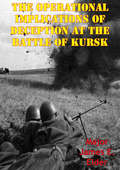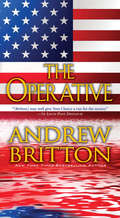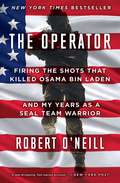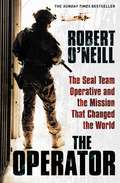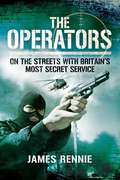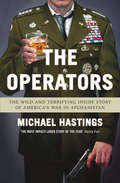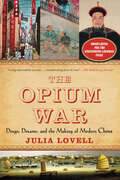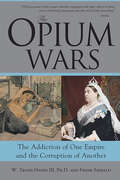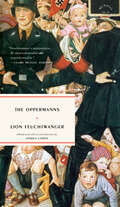- Table View
- List View
The Olive Branch from Palestine: The Palestinian Declaration of Independence and the Path Out of the Current Impasse
by Jerome M. SegalIsraeli settlements are proliferating in Palestinian territory, and if they are annexed, the possibility of a future Palestinian state is virtually impossible. Could it have been otherwise? Can it still be? These are the questions Jerome M. Segal poses in The Olive Branch from Palestine. Carefully argued and highly informative, this book is centered on an original strategy that Segal devised—a strategy adopted but only partially implemented by Palestinian leadership, leaving its feasibility untested. The first step of this strategy was the issuance in November 1988 of the Palestinian Declaration of Independence. That document, authored by Palestinian national poet Mahmoud Darwish and modeled on Israel's own Declaration, called for a Palestinian state that would live in peace with Israel. In The Olive Branch from Palestine, Segal provides in the first part an analytical and historical study of the 1988 Declaration, a remarkable act of unilateral peacemaking through which the PLO accepted the legitimacy of the 1947 Partition Resolution and thereby redefined Palestinian nationalism. In the second part, he proposes a new strategy based on solutions to the two core issues of 1948: the preservation of a Jewish state, and the rights and circumstances of Palestinian refugees. With The Olive Branch from Palestine, Jerome Segal offers a new narrative of the peace process and details a Palestinian-led strategy that could end the conflict.
The One Impossible Labyrinth: The Brand New Jack West Thriller (Jack West Series)
by Matthew ReillyTHE BRAND NEW JACK WEST THRILLER'THE HOTTEST ACTION WRITER AROUND' EVENING TELEGRAPHTHE END IS HEREJack West Jr has made it to the Supreme Labyrinth.Now he faces one last race - against multiple rivals, against time, against the collapse of the universe itself - a headlong race that will end at a throne inside the fabled labyrinth.AN IMPOSSIBLE MAZEBut the road will be hard. For this is a maze like no other: a maze of mazes. Uncompromising and complex. Demanding and deadly.A CATACLYSMIC CONCLUSIONIt all comes down to this. It ends here - now - in the most lethal and dangerous place Jack has encountered in all of his many adventures. And in the face of this indescribable peril, with everything on the line, there is only one thing he can do.Attempt the impossible.* * * * *PRAISE FOR THE JACK WEST THRILLERS'An action hero worthy of Lee Child' Sydney Morning Herald'Thrilling, action-packed adventure from cover to cover' Guardian'Nobody writes action like Matthew Reilly' Vince Flynn'Get ready for a wild ride' Daily Telegraph'Exciting and entertaining' Chicago Sun-Times* * * * *READERS LOVE THE JACK WEST THRILLERS'Indiana Jones in a book . . . Immensely entertaining''A super duper kick ass soldier''A first class all-action historical thriller''Heart-pounding stuff''Enjoy the rollercoaster ride'
The One Percent Doctrine: Deep Inside America's Pursuit of Its Enemies Since 9/11
by Ron SuskindPulitzer Prize-winning journalist and bestselling author Ron Suskind takes you deep inside America's real battles with violent, unrelenting terrorists -- a game of kill-or-be-killed, from the Oval Office to the streets of Karachi. You may think you know what the "war on terror" is. But to know it truly, you must read this book. Suskind has written a riveting work of narrative nonfiction, filled with exclusive, historically significant disclosures that will echo across America and the world. What is the guiding principle of the world's most powerful nation as it searches for enemies at home and abroad? The One Percent Doctrine is the deeply secretive core of America's real playbook: a default strategy, designed by Dick Cheney, that separates America from its moorings, and has driven everything -- from war in Afghanistan to war in Iraq to the global search for jihadists. The story begins on September 12, 2001, the day America began to gather itself for a response to the unimaginable. Ultimately, that reply would shape the nation's very character. Suskind tells us what actually occurred over the next three years, from the inside out, by tracing the steps of the key actors -- the notables, from the President and Vice President to George Tenet and Condoleezza Rice, who oversee the "war on terror" and report progress to an anxious nation; and the invisibles, the men and women just below the line of sight, left to improvise plans to defeat a new kind of enemy in an hour-by-hour race against disaster. The internal battles between these two teams -- one, under the hot lights; the other, actually fighting the fight -- reveal everything about what America faces, and what it has done, in this age of terror. Who is actually running U. S. foreign policy? Is there an operational cell, armed with WMDs, inside the United States? Have some of the world's most dangerous terrorists -- including leaders of al Qaeda -- been caught and accidentally released? Can America prevail in this struggle against enemies who are patient, ingenious, certain, and have clear tactical advantage?With his unparalleled access to senior officials, past and present, Ron Suskind -- author of The Price of Loyalty, the most revealing book yet written on the Bush administration -- finally answers the questions that keep Americans awake at night. And in this startling book, he reframes the debates that roil the globe.
The One Ship Fleet: USS Boise—WWII Naval Legend, 1938–45
by Phillip T. Parkerson"If the doings of the U.S. Navy in World War II are of any interest to you, the book is worth a read." — PowerShipsThe Brooklyn-class light cruiser USS Boise (CL-47) was one of the most famous US combat ships of World War II, already internationally renowned following her participation in the naval battles in the Solomons in 1942. After repairs and modifications, in 1943 the Boise was sent to the Mediterranean theater, there to participate in the invasions of Sicily, Taranto, and Salerno, and enhancing her fame by destroying enemy tanks during armored counterattacks in both Sicily and Salerno. From the Mediterranean, Boise was sent to the Southwest Pacific theater to join the US 7th Fleet for the campaign in New Guinea in 1943–44 and then the invasion of the Philippines. She fought in the battle of Leyte Gulf, notably in the night engagement in the Surigao Strait, where battleships faced off against each other for the last time in maritime history. Boise was credited with helping to sink a Japanese battleship. She also fought off the suicide planes known as kamikazes at Leyte and later at Lingayen Gulf during the invasion of Luzon. MacArthur used her as his flagship for the Luzon attack, thereby adding to her already considerable fame, then after helping retake Corregidor and other islands in the Philippines, Boise carried the general on a triumphant tour of the islands. This tour was interrupted for the invasion of Borneo, but completed when the beach was secured. After MacArthur left the ship in June 1945, she returned to the US for overhaul which was just complete as the war ended, by which time she had been awarded 11 battle stars, more than any other light cruiser in her class. This full account of USS Boise’s war not only gives us an insight into how one ship navigated a global conflict, but also an insight into the experiences of the men who served on her, and a new perspective on the naval campaigns of the war.
The One That Got Away (Pen & Sword Military Classics)
by James Leasor Kendal BurtIn World War II James Leasor was commissioned into the Royal Berkshire Regiment and posted to the 1st Lincolns in Burma and India, where he served for three and a half years. His experiences inspired him to write such books as Boarding Party (filmed as The Sea Wolves). He later became a feature writer and foreign correspondent at the Daily Express. Here he wrote The One that Got Away. As well as non-fiction, Leasor has written novels, including Passport to Oblivion, filmed as Where the Spies Are with David Niven
The One-State Condition: Occupation and Democracy in Israel/Palestine
by Ariella Azoulay Adi OphirSince the start of the occupation of Palestinian territories in 1967, Israel's domination of the Palestinians has deprived an entire population of any political status or protection. But even decades on, most people speak of this rule-both in everyday political discussion and in legal and academic debates-as temporary, as a state of affairs incidental and external to the Israeli regime. InThe One-State Condition, Ariella Azoulay and Adi Ophir directly challenge this belief. Looking closely at the history and contemporary formation of the ruling apparatus-the technologies and operations of the Israeli army, the General Security Services, and the legal system imposed in the Occupied Territories-Azoulay and Ophir outline the one-state condition of Israel/Palestine: the grounding principle of Israeli governance is the perpetuation of differential rule over populations of differing status. Israeli citizenship is shaped through the active denial of Palestinian citizenship and civil rights. Though many Israelis, on both political right and left, agree that the occupation constitutes a problem for Israeli democracy, few ultimately admit that Israel is no democracy or question the very structure of the Israeli regime itself. Too frequently ignored are the lasting effects of the deceptive denial of the events of 1948 and 1967, and the ways in which the resulting occupation has reinforced the sweeping militarization and recent racialization of Israeli society. Azoulay and Ophir show that acknowledgment of the one-stateconditionis not only a prerequisite for considering a one- or two-statesolution; it is a prerequisite for advancing new ideas to move beyond the trap of this false dilemma.
The Ones We Let Down: Toxic Leadership Culture and Gender Integration in the Canadian Forces (Human Dimensions in Foreign Policy, Military Studies, and Security Studies)
by Charlotte Duval-LantoineIn 2021, a sexual misconduct scandal struck the Canadian military, leading to a profound crisis in leadership. While some more recent allegations came to light before the #MeToo movement, these latest revelations have historical roots in the 1990s, an era known to service members as the “decade of darkness.”Due to drastic budget cuts and allegations of serious crimes perpetrated by its members, the last decade of the twentieth century was a tumultuous time for the Canadian Armed Forces. Amid this period, a human rights tribunal ordered the military to open its combat positions to women and reach full gender integration by 1999. Yet by 2021, women made up only 16.3 per cent of personnel; women and LGBTQ+ service members continue to face sexual harassment and abuse at all levels. In The Ones We Let Down Charlotte Duval-Lantoine looks at failed efforts to achieve gender parity during the 1990s. She reveals an organization unwilling and unable to change, and attitudes held by military leaders that fed a destructive dynamic and cost lives.As the military grapples with its failure to address cultural misconduct and change its culture, The Ones We Let Down reflects on whether the right lessons were learned from the decade of darkness.
The Ones We Trust (Mira Ser.)
by Kimberly BelleFrom the internationally bestselling author of The Marriage Lie comes a riveting exploration of grief and guilt in the wake of one family&’s shocking loss.When former DC journalist Abigail Wolff attempts to rehabilitate her career, she finds herself at the heart of a shocking conspiracy involving the death of a soldier in Afghanistan. This loss has unspeakable emotional consequences for the family and as news of what happened comes to light, Abigail will stop at nothing to write the story.As she stumbles upon more and more evidence in the case, it seems there are fewer and fewer people she can trust…including her own father, a retired army general. Stunned by the revelations, she is equally surprised to find herself falling for the slain soldier&’s brother, Gabe, a bitter man struggling to hold his family together. Her investigation eventually leads her to an impossible choice, one of unrelenting sacrifice to protect those she loves.Beyond the buried truths and betrayals, questions of family loyalty and redemption, Abigail&’s search is, most of all, a desperate grasp to carry on—and seek hope in the impossible. In this emotionally gripping story, Kimberly Belle has penned an unforgettable narrative and a true testament to the meaning of trust.Originally published in 2015.Don't miss bestselling author Kimberly Belle's next deeply addictive thriller, The Personal Assistant—where she explores the dark side of the digital world when a mommy-blogger&’s assistant goes missing!Look for these other pulse-pounding thrillers by Kimberly Belle: The Marriage Lie The Last Breath Stranger in the Lake My Darling Husband Three Days Missing Dear Wife
The Ongoing Insurgency in Southern Thailand: Trends in Violence, Counterinsurgency Operations, and the Impact of National Politics
by Zachary Abuza National Defense UniversitySince January 2004, a Malay-Muslim–based insurgency has engulfed the three southernmost provinces in Thailand. More than 4,500 people have been killed and over 9,000 wounded, making it the most lethal conflict in Southeast Asia. Now in its 8th year, the insurgency has settled into a low-level stalemate. Violence is down significantly from its mid-2007 peak, but it has been steadily climbing since 2008. On average, 32 people are being killed and 58 wounded every month. Most casualties are from drive-by shootings, but there are also about 12 improvised explosive device (IED) attacks a month. The insurgency is now characterized by less indiscriminate violence and more retaliatory attacks. Insurgents continue to target security forces, government officials, and Muslim moderates who seek accommodation with the Thai state as part of efforts to make the region ungovernable by limiting provision of social services and driving Buddhists from the south. The overall level of violence may be influenced more by insurgent calculations about the optimum amount of violence needed to advance their political goals than by improved capabilities of the security forces. Despite better coordination, Thai counterinsurgency operations are still hampered by bureaucratic infighting and a lack of professionalism. Human rights abuses by security services with blanket immunity under the Emergency Decree continue to instill mistrust among the local population.
The Only Plane in the Sky: An Oral History of 9/11
by Garrett M. GraffNEW YORK TIMES BESTSELLER &“This is history at its most immediate and moving…A marvelous and memorable book.&” —Jon Meacham &“Remarkable…A priceless civic gift…On page after page, a reader will encounter words that startle, or make him angry, or heartbroken.&” —The Wall Street Journal &“Had me turning each page with my heart in my throat…There&’s been a lot written about 9/11, but nothing like this. I urge you to read it.&” —Katie Couric The first comprehensive oral history of September 11, 2001—a panoramic narrative woven from voices on the front lines of an unprecedented national trauma.Over the past eighteen years, monumental literature has been published about 9/11, from Lawrence Wright&’s The Looming Tower to The 9/11 Commission Report. But one perspective has been missing up to this point—a 360-degree account of the day told through firsthand. Now, in The Only Plane in the Sky, Garrett Graff tells the story of the day as it was lived—in the words of those who lived it. Drawing on never-before-published transcripts, declassified documents, original interviews, and oral histories from nearly five hundred government officials, first responders, witnesses, survivors, friends, and family members, he paints the most vivid and human portrait of the September 11 attacks yet. Beginning in the predawn hours of airports in the Northeast, we meet the ticket agents who unknowingly usher terrorists onto their flights, and the flight attendants inside the hijacked planes. In New York, first responders confront a scene of unimaginable horror at the Twin Towers. From a secret bunker under the White House, officials watch for incoming planes on radar. Aboard unarmed fighter jets in the air, pilots make a pact to fly into a hijacked airliner if necessary to bring it down. In the skies above Pennsylvania, civilians aboard United 93 make the ultimate sacrifice in their place. Then, as the day moves forward and flights are grounded nationwide, Air Force One circles the country alone, its passengers isolated and afraid. More than simply a collection of eyewitness testimonies, The Only Plane in the Sky is the historic narrative of how ordinary people grappled with extraordinary events in real time: the father and son caught on different ends of the impact zone; the firefighter searching for his wife who works at the World Trade Center; the operator of in-flight telephone calls who promises to share a passenger&’s last words with his family; the beloved FDNY chaplain who bravely performs last rites for the dying, losing his own life when the Towers collapse; and the generals at the Pentagon who break down and weep when they are barred from trying to rescue their colleagues. At once a powerful tribute to the courage of everyday Americans and an essential addition to the literature of 9/11, The Only Plane in the Sky weaves together the unforgettable personal experiences of the men and women who found themselves caught at the center of an unprecedented human drama. The result is a unique, profound, and searing exploration of humanity on a day that changed the course of history, and all of our lives.
The Only Plane in the Sky: The Oral History of 9/11
by Garrett M. GraffTHE NEW YORK TIMES BESTSELLER "Incredibly evocative and compelling." The Washington Post"A hugely powerful new book." Dan Snow"The most moving and chilling oral history you will read." The Times"Astonishing book about an astonishing, terrifying atrocity, relived in real time by those who were there. I read it in one sitting & was utterly gripped from start to finish." Piers Morgan"An American academic has meticulously pieced together testimony from those who were there, using declassified documents and having conducted hundreds of new interviews. The resulting book is a harrowing picture of a day that changed history." The Sun"Although many years have passed since 9/11, this book, told with such immediacy, brings so vividly back to mind the shock of that day, and why it continues to shape the tragic history that has followed."Lawrence Wright, author of The Looming Tower"The Only Plane in the Sky is a stunning and important work-chilling, heartbreaking-and I cannot stop thinking about it. To hear the voices of those who survived, and those who did not, it is so moving and powerful. I learned so much and am so thankful for this book."Anderson Cooper, Anchor, CNNOf all the books about 9/11 one has been missing until now - a panoramic narrative from the men and women caught up in the unprecedented human drama of that terrible day.The Only Plane in the Sky is nothing less than the first comprehensive oral history of 9/11, deftly woven and told in the voices of ordinary people grappling with extraordinary events. Drawing on never-before-published transcripts, recently declassified documents, new and archived interviews from nearly five hundred people, historian Garrett Graff skillfully tells the story of the day as it was lived. It begins in the predawn hours of airports in the Northeast, where we meet the ticket agents who unknowingly usher terrorists onto their flights. In New York, first responders confront a scene of unimaginable chaos at the Twin Towers. From a secret bunker beneath the White House, Dick Cheney and Condoleezza Rice watch for incoming planes on radar. In the offices of the Pentagon, top officials feel the violent tremor as their headquarters come under attack.We hear the stories of the father and son working on separate floors in the North Tower; the firefighter who rushes to the scene to search for his wife; the telephone operator who keeps her promise to share a passenger's last words with his family; the chaplain who stays on the scene to perform last rites, losing his own life when the Towers collapse; the teachers evacuating terrified children from schools mere blocks from the World Trade Center; the generals at the Pentagon who break down and weep when they are barred from rushing into the burning building to try and rescue their colleagues.The Only Plane in the Sky is a unique, profound, and searing exploration of humanity on a day that changed the course of history, and all of our lives.
The Only Plane in the Sky: Winner of AUDIOBOOK OF THE YEAR at 2020 Audie Awards
by Garrett M. GraffTHE NEW YORK TIMES BESTSELLER Winner of AUDIOBOOK OF THE YEAR at 2020 Audie Awards"Incredibly evocative and compelling." The Washington Post"Although many years have passed since 9/11, this book, told with such immediacy, brings so vividly back to mind the shock of that day, and why it continues to shape the tragic history that has followed."Lawrence Wright, author of The Looming Tower"The Only Plane in the Sky is a stunning and important work-chilling, heartbreaking-and I cannot stop thinking about it. To hear the voices of those who survived, and those who did not, it is so moving and powerful. I learned so much and am so thankful for this book."Anderson Cooper, anchor, CNNOf all the books about 9/11 one has been missing until now - a panoramic narrative from the men and women caught up in the unprecedented human drama of that terrible day.The Only Plane in the Sky is nothing less than the first comprehensive oral history of 9/11, deftly woven and told in the voices of ordinary people grappling with extraordinary events. Drawing on never-before-published transcripts, recently declassified documents, new and archived interviews from nearly five hundred people, historian Garrett Graff skillfully tells the story of the day as it was lived.It begins in the predawn hours of airports in the Northeast, where we meet the ticket agents who unknowingly usher terrorists onto their flights. In New York, first responders confront a scene of unimaginable chaos at the Twin Towers. From a secret bunker beneath the White House, Dick Cheney and Condoleezza Rice watch for incoming planes on radar. In the offices of the Pentagon, top officials feel the violent tremor as their headquarters come under attack.We hear the stories of the father and son working on separate floors in the North Tower; the firefighter who rushes to the scene to search for his wife; the telephone operator who keeps her promise to share a passenger's last words with his family; the chaplain who stays on the scene to perform last rites, losing his own life when the Towers collapse; the teachers evacuating terrified children from schools mere blocks from the World Trade Center; the generals at the Pentagon who break down and weep when they are barred from rushing into the burning building to try and rescue their colleagues.The Only Plane in the Sky is a unique, profound, and searing exploration of humanity on a day that changed the course of history, and all of our lives.
The Only Thing Worth Dying For: How Eleven Green Berets Fought for a New Afghanistan
by Eric BlehmThe untold exploits of the U.S. Army Special Forces team that conquered the Taliban are revealed in this “gripping story of admirable men” (Kirkus).On a moonless night just weeks after September 11, 2001, a U.S. Special Forces team of Green Berets known as ODA 574 infiltrated the mountains of southern Afghanistan with a seemingly impossible mission: to foment a tribal revolt and force the Taliban to surrender. Armed solely with the equipment they could carry on their backs, shockingly scant intelligence, and their mastery of guerrilla warfare, Captain Jason Amerine and his ten men had no choice but to trust their only ally, a little-known Pashtun statesman named Hamid Karzai. Having returned from exile, Karzai—on the run from the Taliban—was traveling the countryside to raise a militia.The Only Thing Worth Dying For chronicles the most important mission in the early days of the Global War on Terror, when the men on the ground knew little about the enemy—and their commanders in Washington knew even less. With unprecedented access to surviving members of ODA 574, key war planners, and Karzai himself, award-winning author Eric Blehm recounts a story of uncommon bravery and terrible sacrifice, intimately exposing the realities of unconventional warfare and nation-building in Afghanistan that continue to shape the region today.“The one book you must read if you have any hope of understanding what our fine American soldiers are up against in Afghanistan.” —Former Congressman Charlie Wilson
The Only Woman in the Room: A Novel
by Marie BenedictShe possessed a stunning beauty. She also possessed a stunning mind. Could the world handle both? <P><P>Her beauty almost certainly saved her from the rising Nazi party and led to marriage with an Austrian arms dealer. Underestimated in everything else, she overheard the Third Reich's plans while at her husband's side, understanding more than anyone would guess. <P><P>She devised a plan to flee in disguise from their castle, and the whirlwind escape landed her in Hollywood. She became Hedy Lamarr, screen star. <P><P>But she kept a secret more shocking than her heritage or her marriage: she was a scientist. And she knew a few secrets about the enemy. She had an idea that might help the country fight the Nazis...if anyone would listen to her. <P><P>A powerful novel based on the incredible true story of the glamour icon and scientist whose groundbreaking invention revolutionized modern communication, The Only Woman in the Room is a masterpiece. <P><b>A New York Times Bestseller</b>
The Onset of World War (Routledge Revivals)
by Manus I. MidlarskyFirst published in 1988, this historical and quantitative analysis of war defines systemic world wars as conflicts of wide scope and intensity, which leave profound historical legacies in their wake. Manus Midlarsky examines various possible explanations for the onset of such past wars as the Peloponnesian War, the Thirty Years’ War, and World Wars I and II. Midlarsky develops his basic theory of systemic war, outlining the reasons for the absence of wars of this magnitude and describing the violations of certain structural conditions that are associated with the onset of world war. A timely and relevant reissue, this insightful analysis will be of particular value to those with an interest in International Relations, War and Peace Studies, Military History, and Security Studies.
The Operational Commander’s Role In Planning And Executing A Successful Campaign
by Major Thomas M. JordanThe rise of industrialization coupled with the growth of technology have contributed to creating a complexity to modern warfare that far exceeds the primitive conditions of earlier periods. Defined as the creative use of distributed operations for the purposes of strategy, success at the operational level requires that commanders practice operational art. Although current doctrine recognizes that the operational commander must link theater strategy to tactical operations through operational art, it fails to provide an adequate description of the commander role in campaign planning. Thus, this monograph examines the operational commander's role in planning and executing a successful campaign.The monograph begins by describing how industrialized societies and technology affected the evolution of warfare thus creating a new medium known as operational art. Next it discusses suitable criteria for determining the commander's role in operational campaigns followed by an explanation of the campaign analysis model consisting of the operational operating systems described in TRADOC Pam 11-9. The monograph then analyzes three successful campaigns: Field-Marshal Slim as the 14th Army commander in Burma; General MacArthur in the World War II Cartwheel Operation and General Ridgway as the 8th Army commander in Korea.
The Operational Implications Of Deception At The Battle Of Kursk
by Major James E. ElderThis monograph analyzes the use of deception by the Germans and Soviets in the battle of Kursk. It uses a paradigm consisting of: commander's aim, intelligence, centralized control, synchronization and operations security to determine why Soviet deception succeeded and German deception failed. The analysis provides insights into the use of operational deception on the modern battlefield.The conclusions of this monograph suggest that: operational deception is not a separate deception activity; that it can be used in the offense or defense; that it can be a viable combat multiplier today and that deception is an acquired Skill. The study monograph shows that operational deception must organize and control the deception efforts at the tactical level and that simple battlefield deception techniques can produce an operational effect.The monograph shows the critical role commanders have in establishing an appropriate course of action that sets the stage for deception. The selected course of action must provide a picture of duplicity to the enemy commander by presenting two possible objectives. This concept of alternative objectives allows the deception activity to flow naturally from the COA and confuse the enemy.The monograph recommends incorporation of deception into the officer corps professional development through professional reading programs in schools and practical application at the National Training Center. Combat Maneuver Training Center, Joint Readiness Training Center and the Battle Command Training Program. It also recommends that the Army develop and field sufficient communications and non-communications' devices to allow Army Groups to simulate a U.S. Corps.
The Operative (A Ryan Kealey Thriller #5)
by Andrew BrittonAfter more than a decade on the deadly front lines of the war on terror, Ryan Kealey believes he's finally put danger behind him--and some of his demons to rest. But his calm is shattered when he's swept into a merciless terror attack during a charity gala in downtown Baltimore. Among the dozens of casualties is the wife of CIA Deputy Director John Harper. With normal channels of investigation obstructed, Harper turns to Kealey, the one man with the resources, expertise--and freedom from government interference--to pursue the awful truth.Following a string of secrets and violence, Kealey blazes a trail from the confines of the innermost chambers of government and big business to the dimmest reaches of the human psyche, forced to match wits with a new nemesis aided by new allies, each with a unique agenda. Slowly, Kealey unspools an unimaginable conspiracy that suggests America may in fact be its own worst enemy. "[Britton] may well give Tom Clancy a run for the money." -St. Louis Post-Dispatch "No-holds-barred action and gripping suspense." --Library Journal on The Exile"The 'best' of Tom Clancy, Michael Connelly, and Robert Ludlum all rolled into a single book." --armchairinterviews.com on The Assassin"Brilliantly well-written with plotting sharper than a fence full of razor wire, a sizzling page-turner." --Brad Thor, New York Times bestselling author on The American
The Operator: Firing the Shots that Killed Osama bin Laden and My Years as a SEAL Team Warrior
by Robert O'Neill<P>A stirringly evocative, thought-provoking, and often jaw-dropping account, The Operator ranges across SEAL Team Operator Robert O’Neill’s awe-inspiring four-hundred-mission career, which included his involvement in attempts to rescue “Lone Survivor” Marcus Luttrell and abducted-by-Somali-pirates Captain Richard Phillips and which culminated in those famous three shots that dispatched the world’s most wanted terrorist, Osama bin Laden. <P>In these pages, O’Neill describes his idyllic childhood in Butte, Montana; his impulsive decision to join the SEALs; the arduous evaluation and training process; and the even tougher gauntlet he had to run to join the SEALs’ most elite unit. After officially becoming a SEAL, O’Neill would spend more than a decade in the most intense counterterror effort in US history. For extended periods, not a night passed without him and his small team recording multiple enemy kills—and though he was lucky enough to survive, several of the SEALs he’d trained with and fought beside never made it home. <P>The Operator describes the nonstop action of O’Neill’s deployments in Iraq and Afghanistan, evokes the black humor of years-long combat, brings to vivid life the lethal efficiency of the military’s most selective units, and reveals firsthand details of the most celebrated terrorist takedown in history. <P><b>A New York Times Bestseller</b>
The Operator: The Seal Team Operative And The Mission That Changed The World
by Robert O'Neill<P>A stirringly evocative, thought-provoking, and often jaw-dropping account of SEAL Team Operator Robert O’Neill’s awe-inspiring 400-mission career. <P> O’Neill describes his idyllic childhood in Butte, Montana; his impulsive decision to join the SEALs; the arduous evaluation and training process; and the even tougher gauntlet he had to run to join the SEALs’ most elite unit. After officially becoming a SEAL, O’Neill would spend more than a decade in the most intense counterterror effort in US history. <P>For extended periods, not a night passed without him and his small team recording multiple enemy kills—and though he was lucky enough to survive, several of the SEALs he’d trained with and fought beside never made it home. <P><b>A New York Times Bestseller</b>
The Operators: On The Street with Britain's Most Secret Service (Pen And Sword Military Classics Ser.)
by James RennieFew outside the security services have heard of 14 Company. As deadly as the SAS yet more secret, the Operators of 14 Company are Britains most effective weapon against international terrorism. For every bomb that goes off 14 Company prevent twelve. The selection process is the most physically, intellectually and emotionally demanding anywhere in the world. Trained to operate under cover, Operators have at their disposal an arsenal of techniques and weapons unmatched by any other UK government or military agency. This is the true story of one Operator and of some of the most hair-raising military operations ever conducted on the streets of Britain.
The Operators: The Wild and Terrifying Inside Story of America's War in Afghanistan
by Michael HastingsThe inspiration for the upcoming movie WAR MACHINE, starring Brad Pitt, Tilda Swinton and Ben Kingsley (streaming on Netflix from 26 May).General Stanley McChrystal, the innovative commander of international and US forces in Afghanistan, was living large. Loyal staff liked to call him a 'rock star'. During a spring 2010 trip across Europe to garner additional Allied help for the war effort, McChrystal was accompanied by journalist Michael Hastings of ROLLING STONE. For days, Hastings looked on as McChrystal and his staff let off steam, partying and openly bashing the Obama administration for what they saw as a lack of leadership. When Hastings' piece appeared a few months later, it set off a political firestorm: McChrystal was ordered to Washington, where he was unceremoniously fired.In THE OPERATORS, Hastings gives us a shocking behind-the-scenes portrait of Allied military commanders, their high-stakes manoeuvres and often bitter bureaucratic in-fighting. He takes us on patrol missions in the Afghan hinterlands and to hotel bars where spies and expensive hookers participate in nation-building gone awry, drawing back the curtain on a hellish complexity and, he fears, an unwinnable war.
The Opium War: Drugs, Dreams, and the Making of Modern China
by Julia LovellThis &“crisp and readable account&” of the nineteenth century British campaign sheds light on modern Chinese identity through &“a heartbreaking story of war&” (The Wall Street Journal). In October 1839, a Windsor cabinet meeting voted to begin the first Opium War against China. Bureaucratic fumbling, military missteps, and a healthy dose of political opportunism and collaboration followed. Rich in tragicomedy, The Opium War explores the disastrous British foreign-relations move that became a founding myth of modern Chinese nationalism, and depicts China&’s heroic struggle against Western conspiracy. Julia Lovell examines the causes and consequences of the Opium War, interweaving tales of the opium pushers and dissidents. More importantly, she analyses how the Opium Wars shaped China&’s self-image and created an enduring model for its interactions with the West, plagued by delusion and prejudice.
The Opium Wars
by W. Hanes III Frank SanelloIn this tragic and powerful story, the two Opium Wars of 1839-1842 and 1856-1860 between Britain and China are recounted for the first time through the eyes of the Chinese as well as the Imperial West. Opium entered China during the Middle Ages when Arab traders brought it into China for medicinal purposes. As it took hold as a recreational drug, opium wrought havoc on Chinese society. By the early nineteenth century, 90 percent of the Emperor's court and the majority of the army were opium addicts.Britain was also a nation addicted-to tea, grown in China, and paid for with profits made from the opium trade. When China tried to ban the use of the drug and bar its Western smugglers from it gates, England decided to fight to keep open China's ports for its importation. England, the superpower of its time, managed to do so in two wars, resulting in a drug-induced devastation of the Chinese people that would last 150 years.In this page-turning, dramatic and colorful history, The Opium Wars responds to past, biased Western accounts by representing the neglected Chinese version of the story and showing how the wars stand as one of the monumental clashes between the cultures of East and West."A fine popular account."-Publishers Weekly"Their account of the causes, military campaigns and tragic effects of these wars is absorbing, frequently macabre and deeply unsettling."-Booklist
The Oppermanns
by Lion FeuchtwangerWritten in real time, as the Nazis consolidated their power over the winter of 1933, The Oppermanns captures the fall of Weimar Germany through the eyes of one bourgeois Jewish family, shocked and paralyzed by an ideology they cannot comprehend.In the foment of Weimar-era Berlin, the Oppermann brothers represent tradition and stability. One brother oversees the furniture chain founded by their grandfather, one is an eminent surgeon, one a respected critic. They are rich, cultured, liberal, and public spirited, proud inheritors of the German enlightenment. They don&’t see Hitler as a threat. Then, to their horror, the Nazis come to power, and the Oppermanns and their children are faced with the terrible decision of whether to adapt—if they can—flee, or try to fight. Written in 1933, nearly in real time, The Oppermanns captures the day-to-day vertigo of watching a liberal democracy fall apart. As Joshua Cohen writes in his introduction to this new edition, it is &“one of the last masterpieces of German-Jewish culture.&” Prescient and chilling, it has lost none of its power today.
